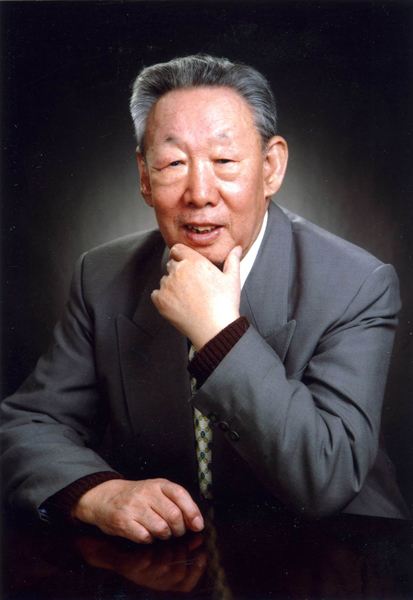Written by: Wu Zhipan
Peking University, October 26, 2022: On October 8, I heard with great sorrow of Professor Zhang Guofu’s passing. When I was studying at PKU Law School, Prof. Zhang had always taken good care of me. Even after his retirement, Prof. Zhang still came to the school once a week, and every time he came, he would come by my office to chat with me. From our conversations, I learned a lot about the history of the faculty. It is only now when I look back that I realize how precious that period was!
Despite my familiarity with Prof. Zhang, I did not actually know much about his life. After his passing, I spoke to my colleagues at PKU Law School to learn more about his personal history.
Zhang Guofu
Prof. Zhang was born in Qingyuan County, north China's Hebei Province in October 1930. He attended primary and secondary school at Baoding No. 2 Middle School and Baoding Normal School respectively. Upon graduation, he was assigned to work in the Linzhang County government in Hebei. In 1954, he enrolled in PKU Law Department. At that time, the faculty had just been re-established (in 1952, PKU Law Department, Tsinghua University Law School and the law faculties of other universities were merged into the Beijing College of Political Science and Law as part of a nationwide university department re-organization). Two years later, some professors from the Beijing College of Political Science and Law, as well as others who completed their legal education at the Beijing Municipal Bureau of Justice, were brought back to PKU to re-establish the Law Department. Prof. Zhang was part of the first batch of students to study in the re-established Law Department.
After graduating in 1958, he stayed at Peking university, first working in the Law Department, and then in the Department of History. During his stint at the Department of History, Professor Zhang taught “Contemporary Chinese History.” In 1981, Mr. Zhang was transferred to the Department of Legal History in the School of Law, teaching courses such as “Chinese Legal History” and “Contemporary Chinese History.” Even after his retirement in April 1993, Mr. Zhang was still engaged in academic research.
Professor Zhang is an expert in the field of legal history and he is renowned for his contributions to the legal history of the Republic of China. Some of his key publications include “A Brief History of the Legal System of the People’s Republic of China.” His academic perspectives have been widely recognized by fellow legal historians.
It could be said that the contributions made by Prof. Zhang and other pioneers in the department of legal history have laid the foundation for the academic discipline.
However, this discipline has also seen its ups and downs.
When I entered the Law Department in 1978, the legal history curriculum comprised four courses: "History of the Chinese Legal System," "History of Chinese Legal Theories," "History of Foreign Legal Systems" and "History of Foreign Legal Theories." These courses introduced students to the intellectual history behind the study of law and exposed them to a range of different legal systems. However, as the proportion of legal history courses in the core curriculum of law decreased, the discipline of legal history faced an existential crisis.
This was also the time when China’s market economy began to emerge. At that time, courses related to the market economy were prioritized, and courses with a greater emphasis on history were overlooked. During the discussions about reforming the core legal curriculum, some teachers even suggested that legal history courses should be removed from the core curriculum to free up time for students to take courses with more practical application and relevance to their future employment. In hindsight, such thinking was not in line with the purpose of legal education at the undergraduate level, which is to provide broad fundamental knowledge for students. Today, with the development of China, there is a greater emphasis on understanding and appreciating the historical development of Chinese traditional culture. As such, courses on our history deserve greater emphasis.
However, even when the relevance of legal history seemed to be waning, Prof. Zhang Guofu still persisted in his passion for legal history research. Even after retirement, he continued to publish papers and write books. It is precisely because of the grit and determination of our predecessors in Law School that we are where we are today.
In 1998, when PKU celebrated its centennial, the Law Department changed its name to PKU Law School. The school leaders decided that the department’s history ought to be organized and written, so they invited Prof. Zhang to write the history of the department from the end of the Qing Dynasty to the Republic of China (1898-1949). Although he was 68 years old and had retired for several years back then, he still worked hard to compile and research the department’s archives. For people in their sixties, writing is not only mental work, but also physical labor. His research eventually culminated in two papers, “The Establishment of the Law Department of Peking University” and “The Teaching Reform of the Law Department of Peking University and Its Good Traditions,” which are to-date some of the most detailed historical research written about PKU Law School.
Although Prof. Zhang has passed, his research on the history of the Chinese legal system has left an indelible impact on the PKU and PKU Law School. Every PKU law student should understand the history of our school and remember that there was once this respectable, lovely, and hardworking teacher who worked silently behind the scenes to make PKU Law School the success it is today.
Prof. Zhang will be sorely missed by all of us.
Translated by: Zou Xueyang
Edited by: Su Huangyi
Source: PKU News (
Chinese)
